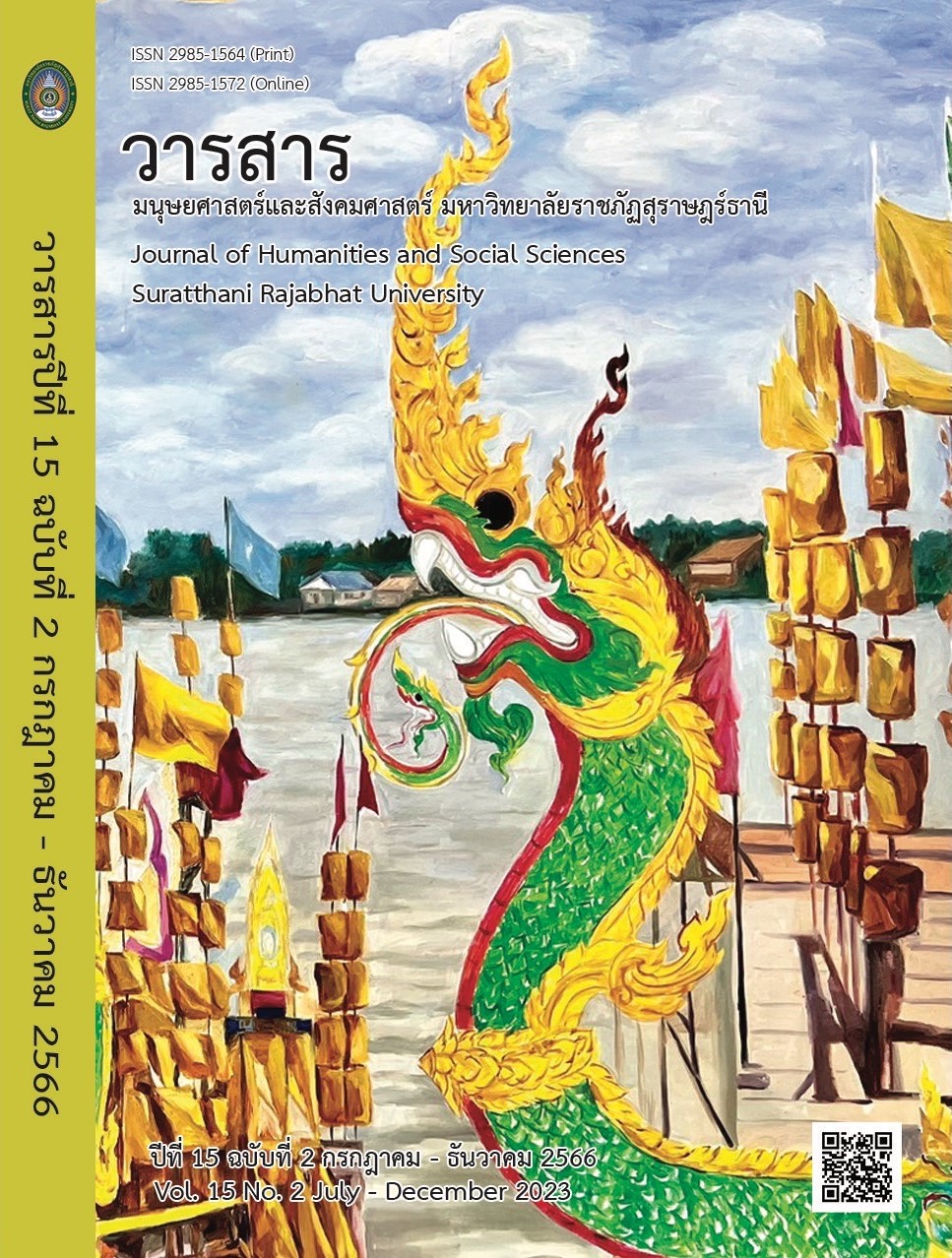The Administration Model Towards Excellence of Vocational Education Institutions in Eastern Region of Thailand
Main Article Content
Abstract
The objectives of this research article were: 1) to study the
components and indicators of management towards excellence of
vocational education institutions and 2) to present the management model towards excellence of vocational education institutions. The study uses a mixed methodology research approach. The research procedures consisted of two main phases. Phase I studies a summary of the components and
indicators of management excellence. The samples were selected from 9 eastern vocational institutes for the academic year 2022, consisting of small, medium, and large institutions. The informants were 18 administrators using the multistage random sampling technique. The research instruments were the unstructured interview and observation. Phase II is creating and
proposing models, analyzing, improving, and summarizing based on experts' opinions by collecting data from 9 executives, snowball sample selection, and structured interview tools. Statistics used to analyze quantitative data include frequency and percentage values, while qualitative uses content analysis.
The research findings revealed that 1) the administrative component towards excellence of vocational education institutions in the eastern region consists of 8 key components: executive, instructor, learner, resources,
management, collaboration networks, ICT system development, and
professional skills development. 2) The management model for excellence of vocational education institutions in the Eastern region of 8 elements is appropriate, accurate, feasible, and can be utilized by the research
theoretical framework. The research results resulted in a desirable model for managing vocational education institutions in Thailand for further
excellence.
Article Details

This work is licensed under a Creative Commons Attribution-NonCommercial-NoDerivatives 4.0 International License.
All published manuscripts have been verified by peer-peer professors in the fields of humanities and social sciences. Reprinting of the article must be authorized by the editorial staff.
References
ถวิกา เมฆอัคฆกรณ์, และ สุวรรณา นาควิบูลย์วงศ์. (2560). การสังเคราะห์องค์ประกอบ
ของครูมืออาชีพทางอาชีวศึกษาในประเทศไทย. วารสารวิทยาลัยดุสิตธานี,
(2), 271-283.
ปภาภัทร แสงแกว, ปรางทิพย์ เสยกระโทก, สุริยะ วชิรวงศไพศาล, และ พงษศักดิ์ ผกามาศ.
(2564). องค์ประกอบการจัดองค์กรแห่งนวัตกรรมทางการศึกษายุคดิจิทัล
สำหรับสถาบันการอาชีวศึกษาภายใต้สถานการณ์วิถีปกติใหม่ในประเทศไทย.
วารสารวิจัยและนวัตกรรมการอาชีวศึกษา สถาบันการอาชีวศึกษาภาคตะวัน
ออกเฉียงเหนือ 1. วารสารวิจัยและนวัตกรรมการอาชีวศึกษา, 5(2), 75-89.
พงษ์ศักดิ์ ผกามาศ, และ ปรางทิพย์ เสยกระโทก. (2557). ภาวะผู้นำทางวิชาการยุคใหม่
สำหรับผู้บริหารสถาบันอุดมศึกษาในภาคตะวันออกเฉียงเหนือ. วารสาร
ทรัพยากรมนุษย์ มหาวิทยาลัยธรรมศาสตร์, 9(2), 145-160.
พงษ์ศักดิ์ ผกามาศ, ปภาภัทร แสงแก้ว, และ ปรางทิพย์ เสยกระโทก. (2561). ภาวะผู้นำทาง
วิชาการสมรรถนะสูงของผู้บริหารสถาบันการอาชีวศึกษาในภาคตะวันออกของ
ประเทศไทย. การประชุมวิชาการระดับชาติและนานาชาติด้านมนุษยศาสตร์
และสังคมวิทยา ครั้งที่ 8, 29-30 พฤศจิกายน 2561, (น.112-128) กรุงเทพฯ:
มหาวิทยาลัยเกษตรศาสตร์.
พงษ์ศักดิ์ ผกามาศ, พิภพ วชังเงิน, และ วรรณรี ปานสิริ. (2562). ปัจจัยเชิงกลยุทธ์ของ
องค์กรที่ส่งผลต่อความสำเร็จของการใช้ระบบไอซีทีเพื่อการศึกษาระดับ
อาชีวศึกษาในภาคตะวันออกของประเทศไทย. การประชุมวิชาการระดับชาติ
ด้านวิทยาศาสตร์และเทคโนโลยี ครั้งที่ 3, 18-19 มกราคม 2562, (น.357-372).
กรุงเทพฯ: มหาวิทยาลัยเทคโนโลยีราชมงคลสุวรรณภูมิ.
พงษ์ศักดิ์ ผกามาศ. (2566). นวัตกรรมทางการศึกษา: องค์ประกอบและกลไกการพัฒนา
สถาบันการศึกษาไทยสู่สากล. วารสารการศึกษาและนวัตกรรมการเรียนรู้
มหาวิทยาลัยสงขลานครินทร์, 3(2), 161-180.
ภาระวี ศุขโรจน์. (2556). รูปแบบการบริหารการเปลี่ยนแปลงสถานศึกษาเอกชนสู่ความ
เป็นเลิศ. วารสารศึกษาศาสตร์ มหาวิทยาลัยนเรศวร, 15(4), 246-259.
สถาบันการอาชีวศึกษาภาคตะวันออก. (2566). รายงานประจำปี พ.ศ. 2565. https://
www.ivee.ac.th/index.php/รายงานประจำปี
สุริยา ห้าวหาญ, ธัชชัย จิตรนันท์, และ วีรพล สารบรรณ. (2559). รูปแบบการบริหารสู่
ความเป็นเลิศของสถานศึกษาสังกัดสำนักงานเขตพื้นที่การศึกษามัธยมศึกษา.
วารสารศึกษาศาสตร์ มหาวิทยาลัยมหาสารคาม, 10(3), 315-328.
สำนักงานคณะกรรมการการอาชีวศึกษา. (2562). กรอบคุณวุฒิอาชีวศึกษาแห่งชาติ พ.ศ.
กรุงเทพฯ: สำนักงานคณะกรรมการการอาชีวศึกษา.
สำนักงานเลขาธิการสภาผู้แทนราษฎร. (2560). โครงการระเบียงเศรษฐกิจภาคตะวันออก
(Eastern Economic Corridor : EEC). https://www.parliament.go.th/
ewtadmin/ewt/parliament_parcy/ewt_dl_link.php?nid=45250
Bell, R., & Liu, P. (2019). Educator Challenges in the Development and
Delivery of Constructivist Active and Experiential Entrepreneurship
Classrooms in Chinese Vocational Higher Education. Journal of
Small Business and Enterprise Development, 26(2), 209-227.
Bhurtel. A. (2015). Technical and Vocational Education and Training in Work
force Development. Journal of Training and Development 2015,
(1), 77-84.
Brunetti, I., & Corsini, L. (2019). School-to-Work Transition and Vocational
Education: a Comparison Across Europe. International Journal of
Manpower, 40(8), 1411-1437.
European Centre for the Development of Vocational Training. (2017).
Exploring Leadership in Vocational Education and Training.
Luxembourg: Publications Office of the European Union.
Galvão, A., Marques, C.S., & Marques, C.P. (2018). Antecedents of
Entrepreneurial Intentions Among Students in Vocational Training
Programmes. Education + Training, 60(7/8), 719-734.
Georgiadou, I., Vlachou, A., & Stavroussi, P. (2020). Development of the
“Special-Vocational-Education-Service-Quality Scale: Listening to
the Voices of Students with Intellectual Disability. Quality
Assurance in Education, 28(2), 89-103.
Lee, S.-Y., Lee, J.C.-K., & Lam, B.Y.-H. (2022). Does renaming improve
public attitudes toward vocational education and training in higher
education? Evidence from a survey experiment. Education +
Training, 64(3), 347-359.
Lester, S. (2015). A Vocational Qualifications System Fit for Sdults? Revisiting
Some Ideas from the University for Industry. Higher Education, Skills
and Work-Based Learning, 5(2), 102-116.
Naziz, A. (2019). Collaboration for Transition Between TVET and University: a
Proposal. International Journal of Sustainability in Higher
Education, 20(8), 1428-1443.
Okolie, U.C., Elom, E.N., Igwe, P.A., Binuomote, M.O., Nwajiuba, C.A., & Igu,
N.C.N. (2021). Improving Graduate Outcomes: Implementation of
Problem-based Learning in TVET Systems of Nigerian Higher
Education. Higher Education, Skills and Work-Based Learning, 11(1),
-110.
Ovbiagele, A.O. (2015). Vocational Education for Socio-Economic and
Technological Development of Nigeria. Global Journal of
Interdisciplinary Social Sciences, 4(4), 15-18.
Phakamach, P., Panjarattanakorn, D., & Onsampant, S. (2023).
Conceptualization and Development of Digital Leadership to Drive
Corporate Digital Transformation for Sustainable Success.
International Journal of Educational Communications and
Technology, 3(2), 27-39.
Phakamach, P., Panjarattanakorn, D., Saengkaew, P., Pangthai, S., & Onsampant,
S. (2023). Innovative Practices in Vocational Education
Administration. International Journal of Educational
Communications and Technology, 3(2), 1-19.
Sinlarat, P. (2020). The Path to Excellence in Thai Education. RICE Journal of
Creative Entrepreneurship and Management, 1(2), 60-75.
Terentyeva, I.V., Kirillova, O., Kirillova, T., Pugacheva, N., Lunev, A.,
Chemerilova, I., & Luchinina, A. (2018). Arrangement of
Cooperation Between Labour Market and Regional Vocational
Education System. International Journal of Educational
Management, 32(6), 1041-1055.
Uemura, M.R.B., & Comini, G.M. (2022). Determining Factors in the
Performance of Integrated Vocational Education Schools.
Revista de Gestão, 29(2), 102-116.
Zhao, Y., & Ko, J. (2020). How do teaching quality and pedagogical practice
enhance vocational student engagement? A Mixed-method
Classroom Observation Approach. International Journal of
Educational Management, 34(6), 987-1000.


